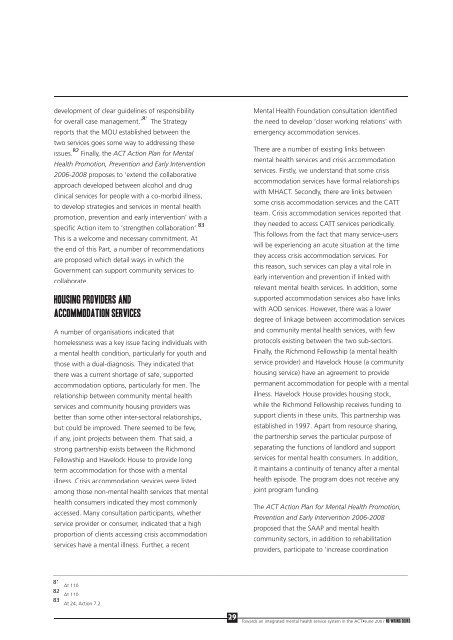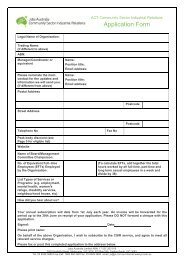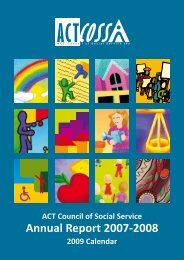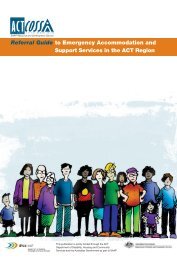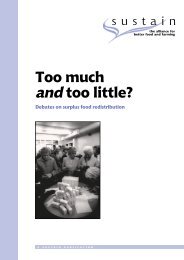actcoss text final.indd - ACT Council of Social Service
actcoss text final.indd - ACT Council of Social Service
actcoss text final.indd - ACT Council of Social Service
You also want an ePaper? Increase the reach of your titles
YUMPU automatically turns print PDFs into web optimized ePapers that Google loves.
development <strong>of</strong> clear guidelines <strong>of</strong> responsibility<br />
for overall case management.’ 81 The Strategy<br />
reports that the MOU established between the<br />
two services goes some way to addressing these<br />
issues. 82 Finally, the <strong>ACT</strong> Action Plan for Mental<br />
Health Promotion, Prevention and Early Intervention<br />
2006-2008 proposes to ‘extend the collaborative<br />
approach developed between alcohol and drug<br />
clinical services for people with a co-morbid illness,<br />
to develop strategies and services in mental health<br />
promotion, prevention and early intervention’ with a<br />
specific Action item to ‘strengthen collaboration’. 83<br />
This is a welcome and necessary commitment. At<br />
the end <strong>of</strong> this Part, a number <strong>of</strong> recommendations<br />
are proposed which detail ways in which the<br />
Government can support community services to<br />
collaborate.<br />
HOUSING PROVIDERS AND<br />
ACCOMMODATION SERVICES<br />
A number <strong>of</strong> organisations indicated that<br />
homelessness was a key issue facing individuals with<br />
a mental health condition, particularly for youth and<br />
those with a dual-diagnosis. They indicated that<br />
there was a current shortage <strong>of</strong> safe, supported<br />
accommodation options, particularly for men. The<br />
relationship between community mental health<br />
services and community housing providers was<br />
better than some other inter-sectoral relationships,<br />
but could be improved. There seemed to be few,<br />
if any, joint projects between them. That said, a<br />
strong partnership exists between the Richmond<br />
Fellowship and Havelock House to provide long<br />
term accommodation for those with a mental<br />
illness. Crisis accommodation services were listed<br />
among those non-mental health services that mental<br />
health consumers indicated they most commonly<br />
accessed. Many consultation participants, whether<br />
service provider or consumer, indicated that a high<br />
proportion <strong>of</strong> clients accessing crisis accommodation<br />
services have a mental illness. Further, a recent<br />
Mental Health Foundation consultation identified<br />
the need to develop ‘closer working relations’ with<br />
emergency accommodation services.<br />
There are a number <strong>of</strong> existing links between<br />
mental health services and crisis accommodation<br />
services. Firstly, we understand that some crisis<br />
accommodation services have formal relationships<br />
with MH<strong>ACT</strong>. Secondly, there are links between<br />
some crisis accommodation services and the CATT<br />
team. Crisis accommodation services reported that<br />
they needed to access CATT services periodically.<br />
This follows from the fact that many service-users<br />
will be experiencing an acute situation at the time<br />
they access crisis accommodation services. For<br />
this reason, such services can play a vital role in<br />
early intervention and prevention if linked with<br />
relevant mental health services. In addition, some<br />
supported accommodation services also have links<br />
with AOD services. However, there was a lower<br />
degree <strong>of</strong> linkage between accommodation services<br />
and community mental health services, with few<br />
protocols existing between the two sub-sectors.<br />
Finally, the Richmond Fellowship (a mental health<br />
service provider) and Havelock House (a community<br />
housing service) have an agreement to provide<br />
permanent accommodation for people with a mental<br />
illness. Havelock House provides housing stock,<br />
while the Richmond Fellowship receives funding to<br />
support clients in these units. This partnership was<br />
established in 1997. Apart from resource sharing,<br />
the partnership serves the particular purpose <strong>of</strong><br />
separating the functions <strong>of</strong> landlord and support<br />
services for mental health consumers. In addition,<br />
it maintains a continuity <strong>of</strong> tenancy after a mental<br />
health episode. The program does not receive any<br />
joint program funding.<br />
The <strong>ACT</strong> Action Plan for Mental Health Promotion,<br />
Prevention and Early Intervention 2006-2008<br />
proposed that the SAAP and mental health<br />
community sectors, in addition to rehabilitation<br />
providers, participate to ‘increase coordination<br />
___________________________________________________________________________________________________________________________<br />
81 At 110.<br />
82 At 110.<br />
83 At 24, Action 7.2.<br />
29 Towards an integrated mental health service system in the <strong>ACT</strong>•June 2007 NO WRONG DOORS


